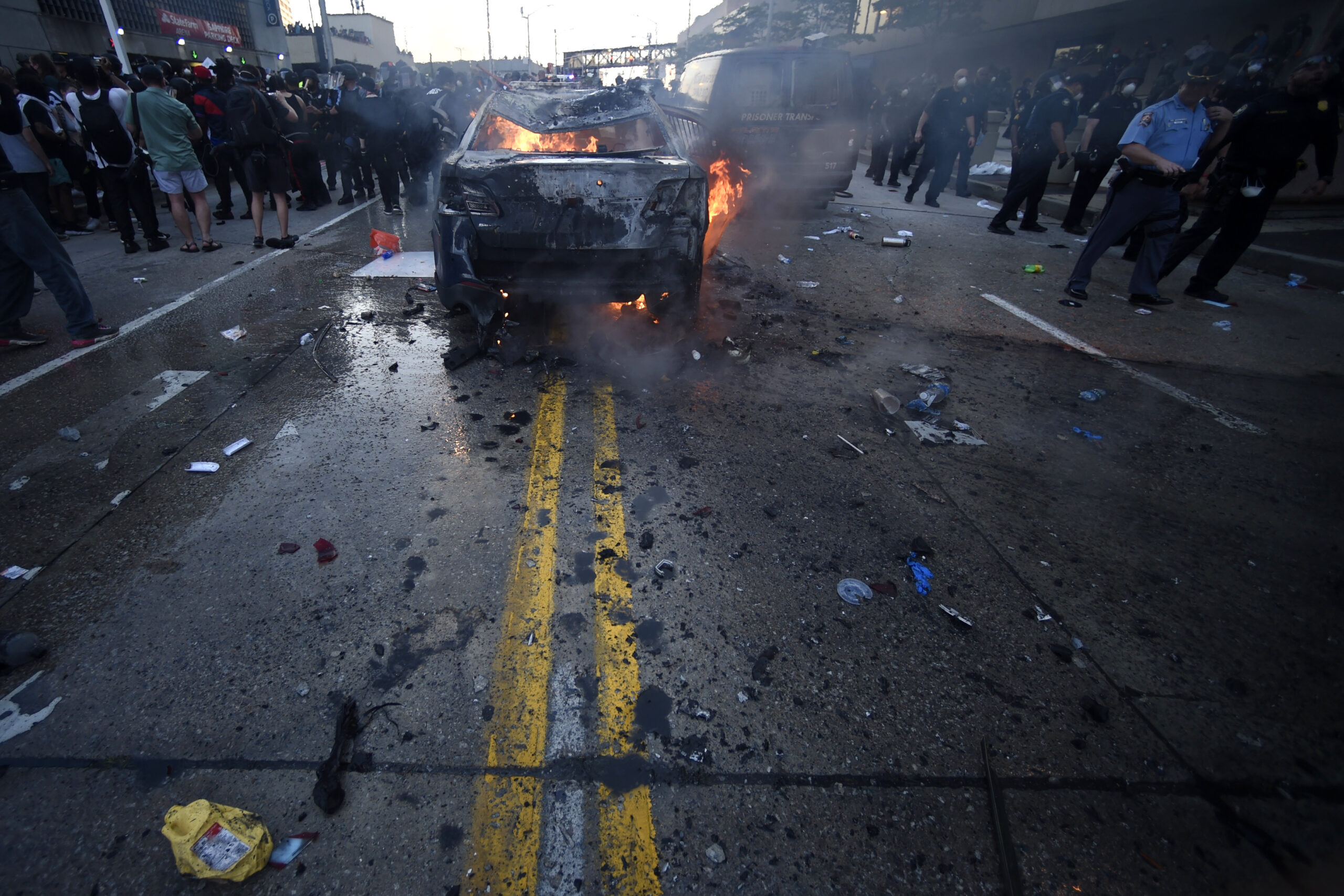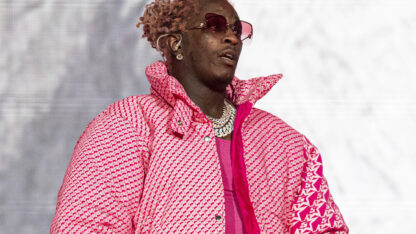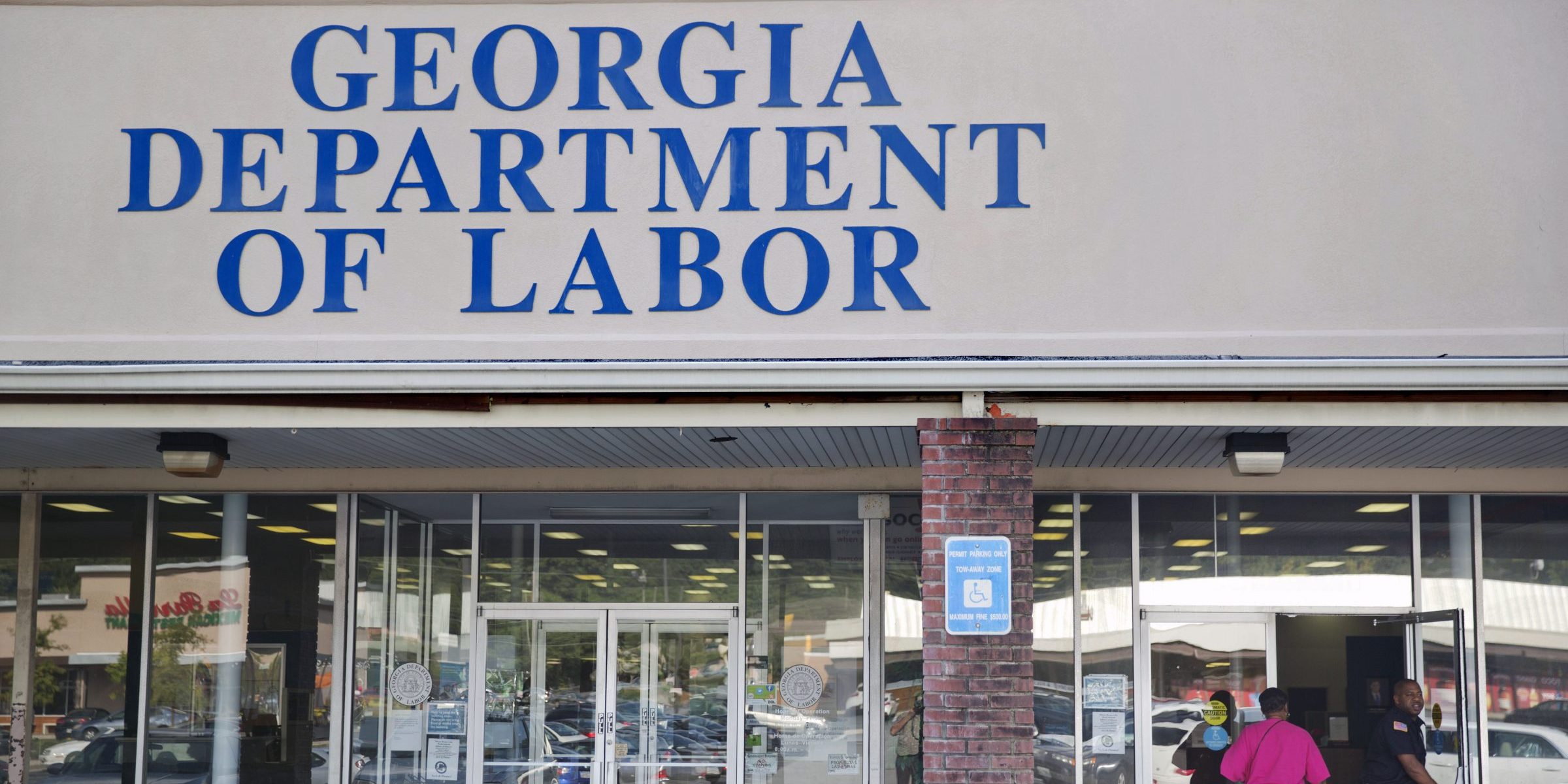Atlanta Protest Turns Chaotic As Hundreds Respond To George Floyd Killing

An Atlanta Police Department vehicle burns during a demonstration against police violence Friday. The protest started peacefully earlier in the day before demonstrators clashed with police.
Mike Stewart / Associated PRess
Updated 10:19 p.m. Friday
Demonstrators marched, stopped traffic and, in some cases, lashed out violently at police as protests erupted Friday in dozens of U.S. cities following the killing of George Floyd after a white officer pressed a knee into his neck while taking him into custody in Minnesota. In Phoenix, Denver, Las Vegas, Los Angeles and beyond, thousands of protesters carried signs that said: “He said I can’t breathe. Justice for George.” They chanted “No justice, no peace” and “Say his name. George Floyd.”
After hours of peaceful protest in downtown Atlanta, chaos broke out, with demonstrators smashing police cars, setting one on fire, spray-painting the iconic logo sign at CNN headquarters, and breaking into a restaurant. The crowd pelted officers with bottles, chanting, “Quit your jobs.”
A squad car was set ablaze by protestors in front of the CNN center in downtown Atlanta. Police extinguished the blaze. Teargas was also deployed shortly before this. pic.twitter.com/oEpSnoQPMz
— Emil Moffatt (@EmilMoffatt) May 30, 2020
Demonstrators stood down police after demands to disperse. Some protesters moved to the city’s major interstate thoroughfare to try to block traffic.
Mayor Keisha Lance Bottoms passionately addressed the protesters at a news conference: “This is not a protest. This is not in the spirit of Martin Luther King Jr.”
“You are disgracing our city,” she told protesters. “You are disgracing the life of George Floyd and every other person who has been killed in this country. We are better than this. We are better than this as a city. We are better than this as a country. Go home, go home.”
Bottoms was flanked by rappers T.I. and Killer Mike, as well as the King’s daughter, Bernice King.
Killer Mike cried as he spoke.
“We have to be better than this moment. We have to be better than burning down our own homes. Because if we lose Atlanta, what have we got?” he said.
How It Started
The protesters gathered earlier in the day to march against the fatal shooting by civilians of Ahmaud Arbery in Brunswick, Georgia, as well as Breonna Taylor in Kentucky, who was shot at least eight times to death by police in her apartment, and most recently Floyd in Minnesota, who died after having a police officer’s knee on his neck for several minutes.
The march was called “Justice for Us.” It was planned to begin at 3 p.m. Friday in Centennial Olympic Park, continue to the state’s Capitol and then end in Centennial Park at 5:30 p.m.
Organizers had called for a “peaceful protest” and said that they would be social distancing, according to the march’s flyer that was circulated on social media.
#ATLforUs 🙌🏾 lets go march, peacefully! Bring a mask! pic.twitter.com/JwSq3te9uQ
— Ari (@ariik_) May 27, 2020
“We see you, we hear you, we love you,” was one of the statements on the rally’s flyer.
Some of the signs protesters held read: “Am I Next?” “White Silence = Compliance” and “Murder Is Murder.”
Rally at the Capitol pic.twitter.com/Pt84Z1SCIi
— Emil Moffatt (@EmilMoffatt) May 29, 2020
Early chants that rang through the crowds were: “Justice now,” “No justice, no peace,” and “I can’t breathe.”
Atlanta was among the many cities across the country, including Minneapolis and Los Angeles, that have been the site for protests following Floyd’s death earlier this week.
Earlier Friday, as the Atlanta protest appeared calmer, Kaity Brackett, 27, said she came out to the protest because she thinks the entire criminal justice system needs to be overhauled, starting with policing.
She said the Arbery killing was a catalyst for her and referred to his death as a lynching. Arbery was killed on Feb. 23 by a former district attorney investigator and his son, who were not arrested until after video emerged months later.
Brackett wore a blue mask and sat with her partner and a friend. She was less concerned about the threat from the coronavirus.
“We risk our lives going to the grocery store, going to get gas,” she said. “This is more important than all of that.”
For a deeper exploration of Ahmaud Arbery’s story, listen to WABE’s podcast, “Buried Truths.” Hosted by journalist, professor, and Pulitzer-prize-winning author Hank Klibanoff, season three of “Buried Truths” explores the Arbery murder and its direct ties to racially motivated murders of the past in Georgia.








